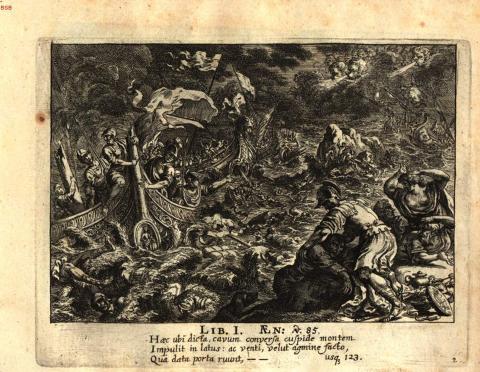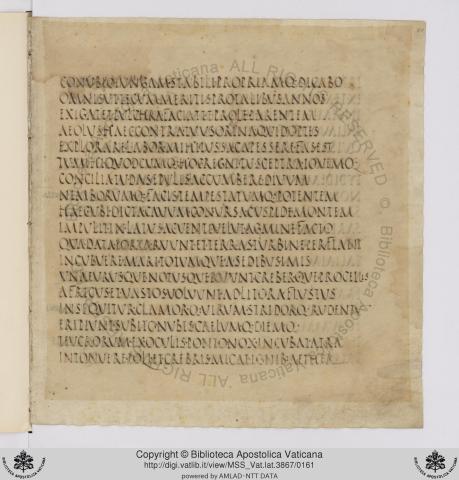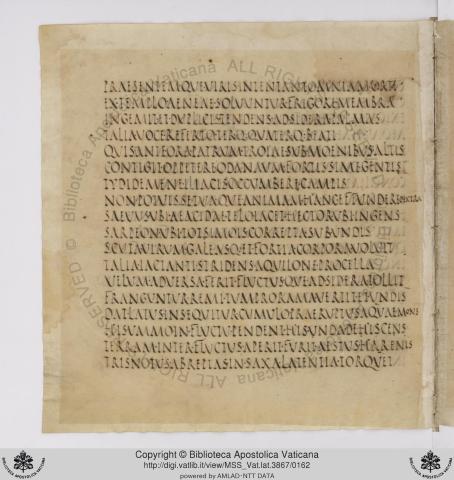CORE VOCABULARY
cavus, a, um: (adj.), hollow, 1.81; concave, 8.599; arching, vaulted, 2.487; cavae manūs, the palms of the hands, 12.86.
cuspis, idis, f.: a spear point, 7.817; point, 5.208; spear, lance, javelin; a spear, 12.386; a spear or, perhaps, the shaft of a spear as a scepter, 1.81.
impellō, pulī, pulsus, 3, a.: to push, thrust, drive to or upon; push onward, impel, 5.242; push, open, 7.621; smite, 1.82; ply, 4.594; put in motion, urge on, 8.3; shoot, 12.856; move, disturb, 3.449; (w. inf.), lead on, impel, induce, persuade, 2.55; force, compel, 1.11.
atque, or ac: (conj.), and in addition, or and besides; and, as well, and indeed, and, 1.575; freq.; even, 2.626; in comparisons, as, 4.90; than, 3.561.
ruō, ruī, rutus, 3, n. and a.: to fall with violence; tumble down, fall, freq.; fall in battle, 10.756; of the sun, go down, set, 3.508; rush forward, 2.64; of the chariot of Nox, hasten up; ascend, rise, 2.250; advance, 10.256; plunge, rush, 2.353; flee, 12.505; tremble, quake, 8.525; hasten, pass away, 6.539; cause to fall; cast down, 9.516; plow, 1.35; cast, throw up, 1.85; throw up or together, 11.211.
turbō, inis, m.: a tornado, whirlwind; storm, tempest, 1.442; whirling cloud, 3.573; wind accompanying the lightning; lightning-blast, 1.45; 6.594; whirling or stormy force, 11.284, et al.; a whirling top, a child's top, 7.378. (cf. turba)
perflō, āvī, ātus, 1, a.: to blew through or over; sweep over, 1.83.
incumbō, cubuī, cubitus, 3, n.: to lay one's self upon; lean or recline upon; (w. dat.), lie on or stretch over, 2.205; fall upon, 1.84; bend to, ply, 5.15; hasten, urge, press on, 2.653; overhang, 2.514; press or bend toward, 5.325; (w. ad and acc.), lean, hang, incline, 8.236; absolute, bend to, urge on the work, 4.397.
ūnā: (adv.), in one place or at one time, together with, at once, at the same time, 3.634, et al.; with -que following, 11.864.
Eurus, ī, m.: the southeast wind, 1.85, et al.; wind, 1.383, et al.
Notus, ī, m.: identical in meaning with auster; the south-wind, 1.85; wind, 6.355; storm, 1.575.
crēber, bra, brum: (adj.), repeated, frequent, 2.731; coming thick and fast, 11.611; blowing fresh; fresh, 5.764; abounding in, full of, 1.85.
procella, ae, f.: a gale, storm, squall, tempest, 1.102.
Āfricus, ī, m.: the southwest wind.
vāstus, a, um: (adj.), empty, void, wild, waste, 9.323; vast, unbounded, 1.118; huge, enormous, immense, 3.647; deep-, vast-, sounding, 1.245.
volvō, volvī, volūtus, 3, a.: to roll, 1.86; roll along or down, 1.101; roll or cast up, 3.206; toss, hurl, 12.906; roll over, roll in the dust, 12.329; cast, hurl down, 1.116; 9.512; roll, wheel, 1.163; of books, open, unroll, 1.262; of the Fates, fix the circle of events, decree, ordain, dispose, 1.22; 3.376; of the mind, revolve, meditate, reflect upon, 1.305; pass, continue, live through, experience, endure, suffer, 1.9; rotam volvere, to complete a cycle, period; (pass.), volvī, roll over, roll, 10.590; turn or wind about, 7.350; to be shed, to flow, 4.449; roll on, revolve, 1.269.
īnsequor, secūtus sum, 3, dep. a.: to follow up, pursue, follow, 5.321; press on, follow up; succeed, 1.87; persecute, pursue, 1.241; w. inf., proceed, 3.32.
strīdor, ōris, m.: a harsh, grating, or whizzing sound; a creaking, whistling, 1.87; din, clank, rattling, 6.558; humming, 7.65. (strīdō)
rudēns, entis, m.: a rope; cord; pl., rudentēs, um or ium, cordage, 1.87.
nūbēs, is, f.: a cloud, 1.516, et al.; storm, 10.809; the air, 12.856; (fig.), flock, multitude, 7.705.
Teucrī, ōrum, m.: the Trojans, descendants of Teucer, 1.38, et al.; adj., Teucrian, Trojan, 9.779, et al. (Teucer)
incubō, uī, itus, 1, n.: to lie, recline upon, w. abl. or dat., 4.83; rest upon, 1.89.
āter, tra, trum: (adj.), black; dark, gloomy, 1.60, et al.; smoky, lurid, 7.456; 4.384; clotted, dark, 3.622; soiled, blackened, 2.272; (fig.), sad, fatal, 6.429; venomous, deadly; of the odor of smoke, 12.591.
intonō, uī, ātus 1, n. and a.: to thunder, 1.90; (impers.), intonat, it thunders, 2.693.
polus, ī, m.: the terminating point of an axis; the celestial pole; (meton.), the heavens, sky, 1.90; air, 1.398.
micō, micuī, 1, n.: to vibrate, dart, 2.475; flash, glitter, gleam, 1.90; tremble, quiver, 10.396.
intentō, āvī, ātus, 1, intens. a.: to stretch, hold out, 6.572; threaten, 1.91. (intendō)
extemplō: (adv.), immediately, forthwith, at once, directly, 6.210. (ex and tempus)
Aenēās, ae, m.: 1. A Trojan chief, son of Venus and Anchises, and hero of the Aeneid, 1.92. 2. Aenēās Silvius, one of the Alban kings, 6.769.
frīgus, oris, n.: cold, frost, 6.309; cold weather, a cold storm; coolness, cool breeze; frost; chilling, paralyzing fear, 1.92; the chill of death, 12.951. (rel. to frīgeō)
ingemō, uī, itus, 3, n. and a.: to sigh or groan, 1.93; (w. acc.), groan for; lament, bewail.
duplex, icis: adj. (duo and plicō), twofold, double, 1.655; lying over each other, lapping, 9.707; both, 1.93; twin, 12.198.
palma, ae, f.: the palm of the hand, 8.69; the hand, 1.93; palm branch, 5.111; a palm branch or wreath as the symbol of victory; reward, prize, 5.349; victory; a victor, 5.339.
ō: (interj. expressing joy, grief, astonishment, desire, or indignation), O! oh! ah! w. voc., 2.281, et al.; w. sī and the subj., oh that, 11.415; sometimes placed after the word to which it relates, 2.281.
ter: (num. adv.), thrice, three times, 1.94, et al. (trēs)
quater: (num. adv.), four times. (quattuor)
Trōia, ae, f.: 1. Troy, the capital of the Troad, 2.625, et al. 2. A city built by Helenus in Epirus, 3.349. 3. A part of the city of Acesta in Sicily, 5.756. 4. The name of an equestrian game of Roman boys, 5.602.
oppetō, petīvī or petiī, petītus, 3, a.: to encounter; with or without mortem, to die, fall, perish, 1.96. (ob and petō)
Danaī, ōrum, m.: the Greeks, 2.327.
Tӯdīdēs, ae, m.: the son of Tydeus, Diomedes or Diomed, 1.97, et al.
Īliacus, a, um: (adj.), belonging to Ilium; Ilian, Trojan, 1.97, et al.
occumbō, cubuī, cubitus, 3, n.: to sink, fall upon; die, 1.97; meet, 2.62. (ob and cubō)
possum, potuī, posse, irreg. n.: to be able; can, 1.242, et al.; to avail, have influence, power, 4.382. (potis and sum)
effundō, fūdī, fūsus, 3, a.: to pour out or forth; shed, 2.271; throw, cast out, 7.780; cast, 6.339; overthrow, 11.485; bring out, 9.68; unbind, dishevel, 4.509; dissolve, 2.651; let loose, throw out, 5.818; spend, lose, waste, 5.446; of words, utter, 5.780; (pass.), effundī, dart, 5.145; flow, 6.686. (ex and fundō)
Aeacidēs, ae, m.: a son or descendant of Aeacus. 1. Achilles, as the grandson of Aeacus, 1.99. 2. Pyrrhus, the son of Achilles, 3.296. 3. Perseus, their descendant, king of Macedon, 6.839.
Hector, oris, m.: son of Priam, and chief defender of Troy, 1.99, et al.
Sarpēdōn, onis, m.: Sarpedon, son of Jupiter and Europa, killed at the siege of Troy by Patroclus, 1.100, et al.
Simoīs, Simoentis, m.: a river which falls into the Scamander near Troy, 1.100, et al.
corripiō, ripuī, reptus, 3, a.: to take completely or eagerly; to grasp, snatch, seize, catch, 1.45; hurry away, 1.100; tear away; hasten on, take, 1.418; raise quickly, rouse, 4.572; sē corripere, to hasten away, 6.472. (com- and rapiō)
scūtum, ī, n.: an oblong shield carried by the Roman legionary; a shield in general, 1.101, et al. (σκύτος, hide)
galea, ae, f.: a helmet, either of leather or of metal, 3.468, et al.




